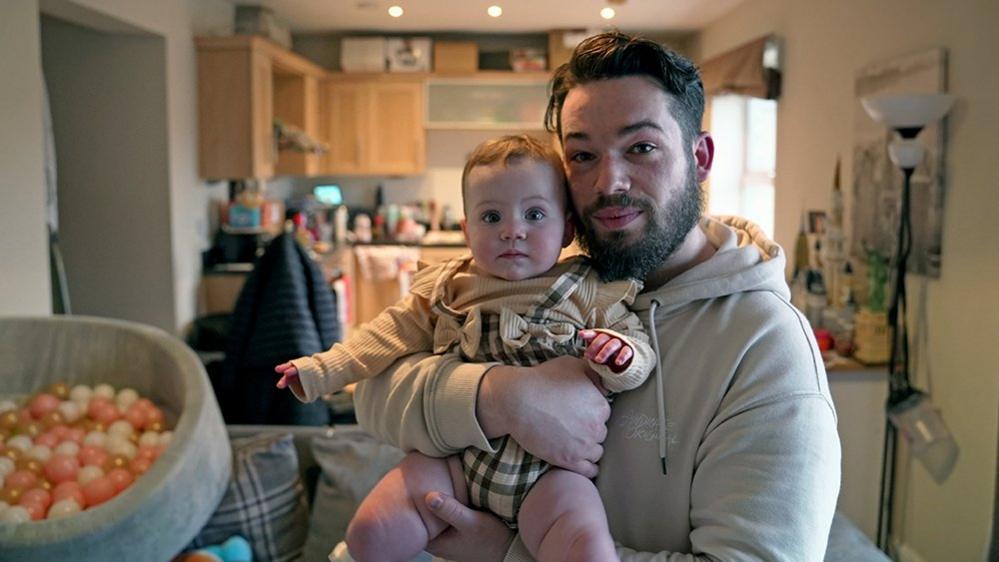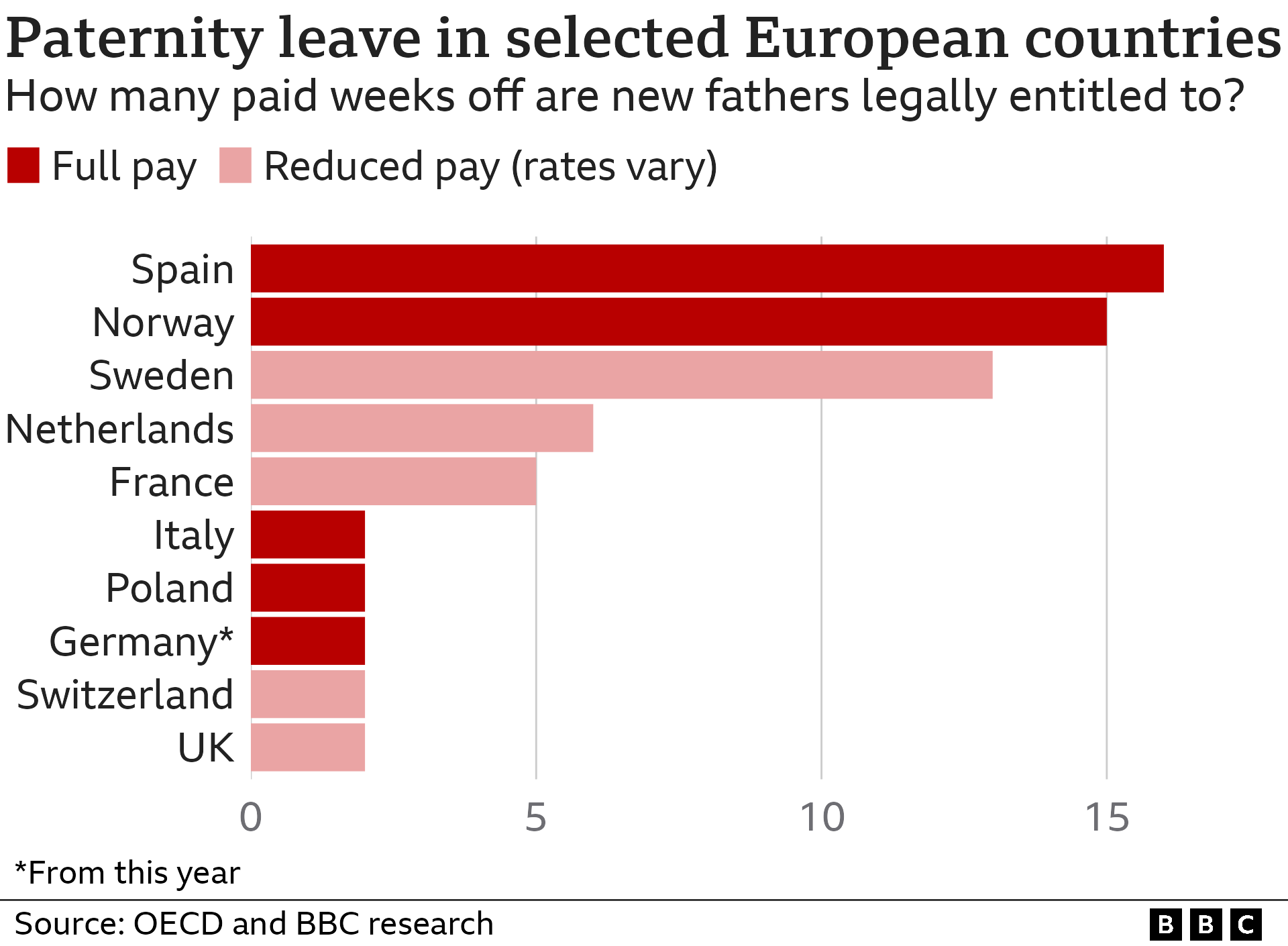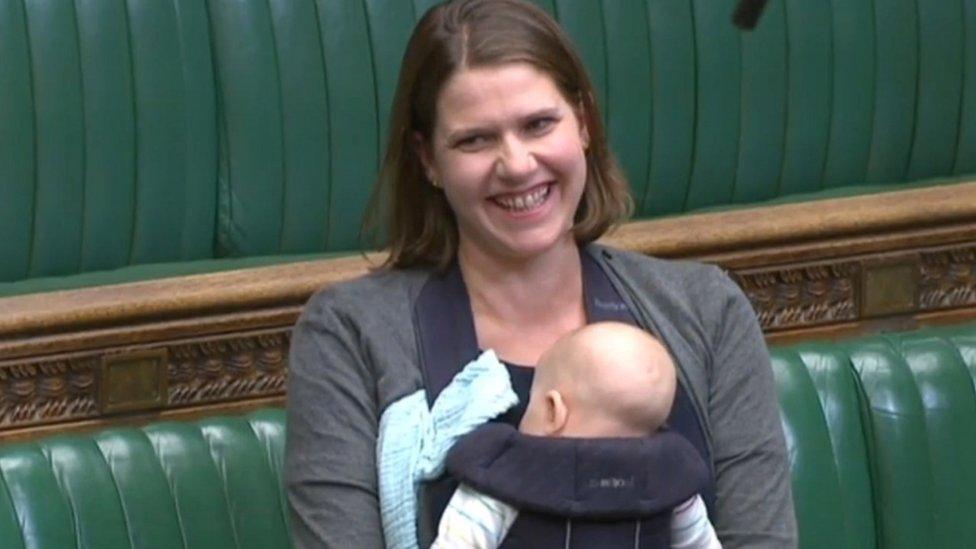Paternity leave: Call for more help as fathers cannot afford time off
- Published
- comments

Sean Craig says the latest government changes to paternity leave are "pointless"
New paternity-leave rules come into effect on Friday, for fathers in England, Wales and Scotland.
But campaigners say they do not go far enough and are calling on the government to give all new fathers more time off at better pay.

When Sean Craig was preparing for the arrival of his baby girl, he had hoped to use two weeks' paternity leave to spend time with his daughter.
But he and his partner, Bethany Lee, realised they would not be able to afford the "massive" drop in his wages.
Statutory paternity leave, external, which is government-funded, allows most new fathers in the UK to take up to two weeks off work. It applies to all partners, regardless of gender, after the birth, surrogacy or adoption of a baby.
Those eligible receive £172.48 a week or 90% of their average earnings, whichever is lower. For most fathers this is £172.48 a week, which is less than half of Sean's weekly salary.
"That's not even two shifts a week," says Sean, who works night shifts in a casino.
"I wouldn't have been able to afford my rent."
Sean, from Bailiff Bridge, West Yorkshire, chose to take two weeks of annual leave instead - almost half of which was spent looking after baby Isla, who had jaundice, in hospital.
A survey from parenting charity Pregnant Then Screwed (PTS), in 2024, found of more than 500 new fathers and secondary parents who did not take their full paternity or parental leave allowance, 70% said they could not afford to.
In a similar survey, in 2023, 43% said they could not use their full parental-leave entitlement because of financial concerns.
Fathers are ineligible for statutory paternity leave if they are self-employed, earn less than £123 a week or have not been continuously employed by the same company for at least 26 weeks.
The changes to the law, external will apply to babies born after 6 April:
The £172.48 weekly maximum is rising to £185.03
Fathers can take two weeks' leave in separate one-week chunks
They can take their leave at any point within the baby's first year
Employers only need four weeks' notice, instead of 15.
But Sean says the changes are "pointless" for fathers like him.
"I couldn't take it then - and even now, I still couldn't take it," he says.
The Fatherhood Institute says the changes "fail to address the reality of hard-working families' financial challenges".
And PTS founder Joeli Brearly, calls them "a missed opportunity".
PTS wants all fathers, including those self-employed, paid 90% of their salary for six weeks, however long they have had their job.
'Greater flexibility'
Research by PTS, the Centre for Progressive Policy and Women in Data suggests countries with more than six weeks' paid paternity leave have a 4% smaller gender pay gap.
"Paternity leave is really good for gender equality, it's really good for the economy and it's really good for the whole family," Ms Brearly says.
And the "impetus" to fix the problem lies with the government.
The government says its changes "provide greater flexibility" for families.
Fathers can also take advantage of shared parental leave, which lets parents split 37 weeks' paid leave between them.
But most other European countries have more generous statutory policies.

Some companies offer enhanced paternity leave, however, giving fathers more time off work or topped-up pay.
Tom Mills was given 13 weeks off work at full pay by his employer, Monzo, when his daughter, Heidi, was born.
"It's given me the chance to be a better dad," says Tom, who lives near Swindon.
"I certainly feel much more confident having had that solid space of time to bond together."
Monzo also allows employees to split their leave into chunks, so Tom took six weeks when Heidi was born, last year, and is spending the remaining seven with family in Australia.

Michele and Tom have taken their nine-month-old daughter, Heidi, to visit her grandparents in Australia
But for small companies such as Production Park, which employs about 30 people, at its base, in West Yorkshire, extending statutory paternity leave to six weeks would be a "shock", owner Jim Farmery says.
It tops up paternity pay to full salary for two weeks - but any longer "would be difficult to manage".
"If you're a huge bank or a huge retailer, you could absorb this," Jim says.
"You can't do that in a little company."
But Tom's wife, Michele Durman, says his enhanced leave was "a gamechanger" and she would back a change in statutory rules "with everything I've got".
"If statutory paternity leave can be increased to six weeks and at a good, healthy pay rate, women will feel so much more supported in those early days," she says.

Are you a father-to-be? Do the new rules go far enough? Share your views by emailing haveyoursay@bbc.co.uk, external.
Please include a contact number if you are willing to speak to a BBC journalist. You can also get in touch in the following ways:
WhatsApp: +44 7756 165803
Tweet: @BBC_HaveYourSay, external
Please read our terms & conditions and privacy policy
If you are reading this page and can't see the form you will need to visit the mobile version of the BBC website to submit your question or comment or you can email us at HaveYourSay@bbc.co.uk, external. Please include your name, age and location with any submission.
Related topics
- Published7 November 2023

- Published27 September 2018

- Published17 January 2024
